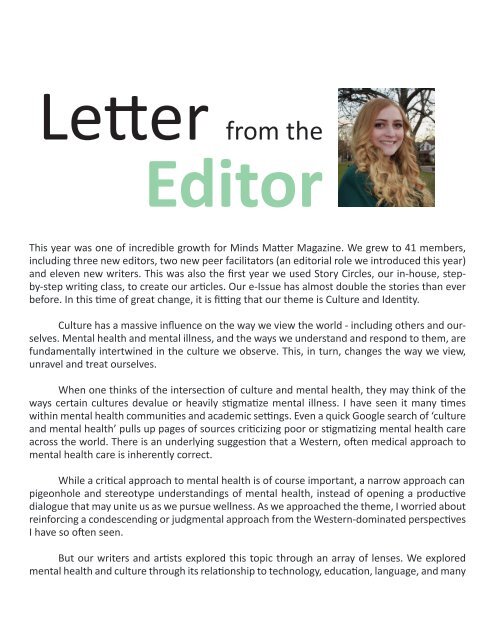Culture & Identity
You also want an ePaper? Increase the reach of your titles
YUMPU automatically turns print PDFs into web optimized ePapers that Google loves.
Minds Matter Magazine Volume III Issue I <strong>Culture</strong> & <strong>Identity</strong><br />
Letter from the<br />
Editor<br />
This year was one of incredible growth for Minds Matter Magazine. We grew to 41 members,<br />
including three new editors, two new peer facilitators (an editorial role we introduced this year)<br />
and eleven new writers. This was also the first year we used Story Circles, our in-house, stepby-step<br />
writing class, to create our articles. Our e-Issue has almost double the stories than ever<br />
before. In this time of great change, it is fitting that our theme is <strong>Culture</strong> and <strong>Identity</strong>.<br />
I was also delighted by the passion I saw at our Story Circles. I worried about loading more<br />
classes on already-burdened students. But I was met with consistent excitement, dedication<br />
and a hunger to learn about storytelling. It made teaching for the first time - an idea that once<br />
seemed impossible to me as someone with a severe anxiety disorder - an encouraging opportunity<br />
for my own growth, for which I am extremely grateful.<br />
As you read our e-Issue, I invite you to challenge your ideas of what mental health means<br />
in the context of culture and identity, as my own views were by the brilliant people that make up<br />
our masthead. With the guidance of the amazing Jessica Dere, who inspires me each time I see<br />
her, we have created an issue that I am proud and excited to share with you.<br />
Alexa Battler<br />
Alexa is a fourth year student specializing in journalism and minoring in political science<br />
more. Their interpretations of this theme are creative, vast and captivating.<br />
<strong>Culture</strong> has a massive influence on the way we view the world - including others and ourselves.<br />
Mental health and mental illness, and the ways we understand and respond to them, are<br />
fundamentally intertwined in the culture we observe. This, in turn, changes the way we view,<br />
unravel and treat ourselves.<br />
When one thinks of the intersection of culture and mental health, they may think of the<br />
ways certain cultures devalue or heavily stigmatize mental illness. I have seen it many times<br />
within mental health communities and academic settings. Even a quick Google search of ‘culture<br />
and mental health’ pulls up pages of sources criticizing poor or stigmatizing mental health care<br />
across the world. There is an underlying suggestion that a Western, often medical approach to<br />
mental health care is inherently correct.<br />
While a critical approach to mental health is of course important, a narrow approach can<br />
pigeonhole and stereotype understandings of mental health, instead of opening a productive<br />
dialogue that may unite us as we pursue wellness. As we approached the theme, I worried about<br />
reinforcing a condescending or judgmental approach from the Western-dominated perspectives<br />
I have so often seen.<br />
But our writers and artists explored this topic through an array of lenses. We explored<br />
mental health and culture through its relationship to technology, education, language, and many<br />
7






